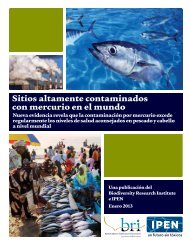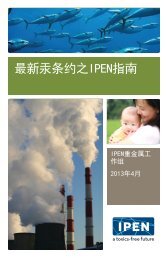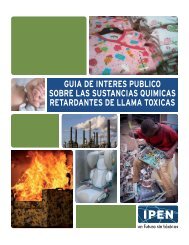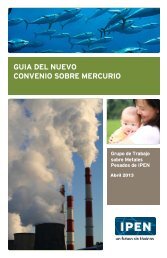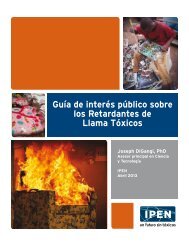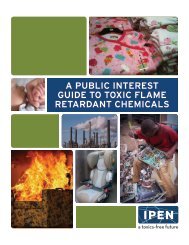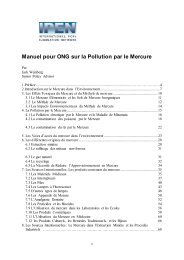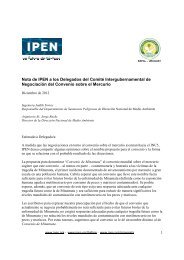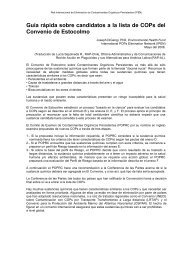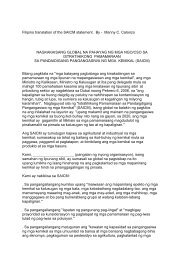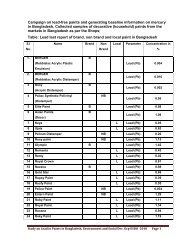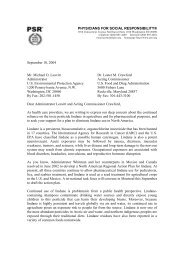The UNDP-GEF POPs Resource Kit - International POPs Elimination ...
The UNDP-GEF POPs Resource Kit - International POPs Elimination ...
The UNDP-GEF POPs Resource Kit - International POPs Elimination ...
Create successful ePaper yourself
Turn your PDF publications into a flip-book with our unique Google optimized e-Paper software.
I. INTRODUCTION AND SUMMARY<br />
1. <strong>The</strong> 5 th session of the Intergovernmental Negotiating Committee (INC) for an<br />
“<strong>International</strong> Legally Binding Instrument for Implementing <strong>International</strong> Action on certain<br />
Persistent Organic Pollutants” (<strong>POPs</strong>) met from December 4-9, 2000, in Johannesburg, South<br />
Africa, and concluded negotiations for a <strong>POPs</strong> Convention. <strong>The</strong> objective of the Convention<br />
is to protect human health and the environment from <strong>POPs</strong>. It will be adopted and opened for<br />
signature at a Conference of Plenipotentiaries scheduled for May 22-23, 2001, in Stockholm.<br />
2. Article 14 of the Convention designates the Global Environment Facility (<strong>GEF</strong>), on<br />
an interim basis and until the Conference of the Parties decides otherwise, as the “principal<br />
entity entrusted with the operations of the financial mechanism.” <strong>The</strong> <strong>GEF</strong> Council, at its 16 th<br />
Session in November 2000, decided that “should the <strong>GEF</strong> be the financial mechanism for the<br />
legal agreement it would be willing to initiate early action with regard to the proposed<br />
enabling activities with existing resources.” <strong>The</strong>se initial guidelines represent an early<br />
response by the <strong>GEF</strong> to assist eligible developing countries to implement the Convention.<br />
<strong>The</strong> main focus of the <strong>GEF</strong>’s assistance at this initial stage is the preparation of National<br />
Implementation Plans (NIPs) for the Convention and first reporting obligations. This type of<br />
support is referred to in the <strong>GEF</strong> as “enabling activities.”<br />
3. <strong>The</strong> guidelines were developed by the <strong>GEF</strong> Secretariat in consultation with the <strong>GEF</strong><br />
<strong>POPs</strong> Task Force comprising the three Implementing Agencies of the <strong>GEF</strong> -- <strong>The</strong> World<br />
Bank, the United Nations Development Programme (<strong>UNDP</strong>) and the United Nations<br />
Environment Programme UNEP), the Food and Agriculture Organization of the United<br />
Nations (FAO), the United Nations Industrial Development Organization (UNIDO), and<br />
UNEP Chemicals as the interim Secretariat of the Convention. <strong>The</strong>y are initial guidelines that<br />
will be revised, as needed, taking into account the decisions of the Conference of the Parties<br />
(COP) to the Convention.<br />
4. This paper describes: (a) Country eligibility criteria; (b) Eligible activities and<br />
sequencing; and (c) Expedited procedures for processing proposals for <strong>GEF</strong> assistance.<br />
5. A summary of the provisions of the Convention as well as a framework that can be<br />
followed by countries to develop NIPs are presented in Annexes A and B.<br />
II. BACKGROUND AND CONTEXT<br />
Persistent Organic Pollutants<br />
6. For the past 40 years, awareness has been growing about the threats posed to human<br />
health and the global environment by the ever-increasing release in the natural environment<br />
of synthesized chemicals. Mounting evidence of damage to human health and the<br />
environment has focused the attention of the international community on a category of<br />
substances referred to as Persistent Organic Pollutants (<strong>POPs</strong>). Some of these substances are<br />
108 ----------------------------------------------------------------------------------------<strong>UNDP</strong>-<strong>GEF</strong> <strong>POPs</strong> <strong>Resource</strong> <strong>Kit</strong>



